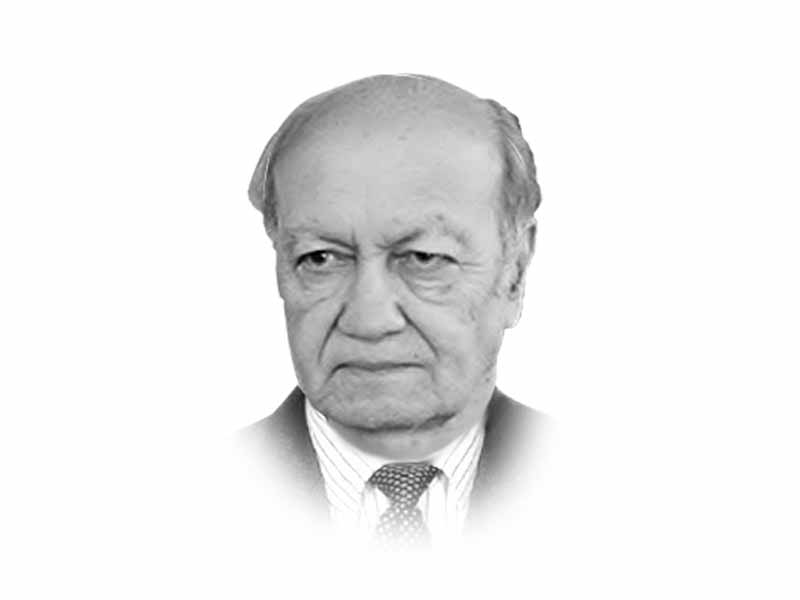
The formation of the Cabinet Committee on National Security (CCNS) was also a sound decision. As the Committee includes all relevant power centres, it can act as an effective forum for institutional decision-making. One expects that soon it will have a functioning secretariat, planning committee and an advisory board and affiliated think tanks to provide independent and valuable advice. This forum should be able to improve coordination between major institutions, assist in formulation of well thought out policies and bring the civilian and military leadership on the same page. If we look back, our greatest failing has been that most of the major policy decisions on security, defence, and even foreign affairs, were taken independently by the army leadership and had a heavy security bias. Absence of institutional decision-making resulted in looking at problems in compartments and not holistically. It is this linear approach that resulted in the disastrous consequences of the 1965 war, tragic separation of erstwhile East Pakistan in 1971 and the relatively more recent Kargil fiasco.
There is however, criticism from certain quarters that the government should have set up a National Security Council or a more powerful higher defence organisation as opposed to the CCNS. In the light of the prime minister’s previous experience with the top military brass, he was not prepared to accept these proposals. The prime minister seems to be more comfortable with the forum of the CCNS and truly, this is what matters most in restoring the civil-military balance.
Regrettably, three months have passed since the CCNS was established, but it has not met even once. Considering the magnitude of security, foreign and economic challenges that the country is facing, regular meetings at reasonable intervals should have been held. The need is to bring about legislation or rules of business that makes it mandatory for the CCNS to meet, at least, once a month.
The prime minister’s recent announcement of formulating a national security strategy and security policy was a long delayed but welcome development. Under the rubric of the national security policy will be the formulation of defence, foreign, economic, counter-terrorism and counter-insurgency policies. With the country facing multiple threats — insurgency in the tribal region, the volatile Western border, terrorism, militancy in Balochistan, lawlessness in Karachi, sectarian conflicts and the conventional threat on the eastern border — all require different responses. In such a complex security situation, it is essential to develop a comprehensive security policy that is responsive to all these threats. Many of these are mutually reinforcing. Addressing these threats would require, in addition to an application of force, several other elements of national power.
The nature of threat has changed over the years, but our responses, organisational structures and doctrines have been slow at adjusting to these new realities. The previous COAS, General Kayani, had correctly identified that the internal threat was the most dangerous. Pakistan’s participation in the Afghan Jihad in the 1980s and subsequently, the iconic event of 9/11 introduced the country to a new form of warfare that has no clear battle lines. Moreover, we are faced with unrealistic and ambiguous demands from militant groups that cannot be met by any self-respecting leader in authority. The threat from India has receded although the challenge from there is now of a different nature. So, the CCNS will have to give maximum attention to the internal threat.
Pakistan’s new civil and military leadership realises that supporting jihadists would mean inviting internal threats and adversarial relationships with all its neighbours and the international community. But to cut off ties from radical groups is not an easy task and has to be executed through a well thought out and nuanced policy. The deradicalisation and reintegration of militant groups should be a matter demanding the serious attention of the CCNS.
The CCNS will soon have to take a decision on wresting control in North Waziristan. It is time that we gave up the policy of remaining passive observers to the activities of the militant groups as a part of misplaced convergence with some of their objectives, or as long as the activities are not directed against Pakistan.
In today’s world, the way to enhance a country’s influence is through building strong economic and commercial links, creating cultural bonds and moving towards policy alignments. The use of asymmetric forces is no more a strategic asset but a huge liability. The militant groups, apart from posing a serious threat to Pakistan’s own integrity, undermine all genuine efforts at fostering good neighbourly relations with the US, India, Afghanistan and even create misgivings with our lone trusted ally China due to their fears of linkages between Uighurs and radical groups in the tribal region.
The most effective way to pursue the Kashmir issue with India is at the political and diplomatic level. And it is crucial that the military leadership in its collective thinking remains in sync with the political government.
Moreover, merely targeting a few militant outfits will not be enough unless attention is also paid to improve governance, control fiscal transfers and put a squeeze on sources of funding and suppress communications of militant organisations. And if this pressure is not enough, the government should resort to military operations to clear safe havens.
The world today stands united against terrorism and for Pakistan, it is a great opportunity to recast its policies as it will find both its people and the international community standing solidly behind it.
Published in The Express Tribune, December 25th, 2013.
Like Opinion & Editorial on Facebook, follow @ETOpEd on Twitter to receive all updates on all our daily pieces.
COMMENTS (20)
Comments are moderated and generally will be posted if they are on-topic and not abusive.
For more information, please see our Comments FAQ



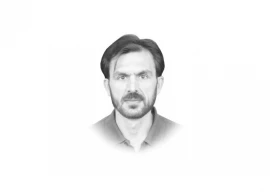


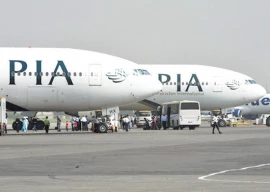
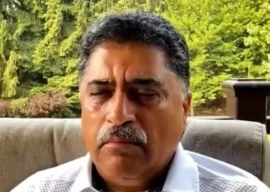


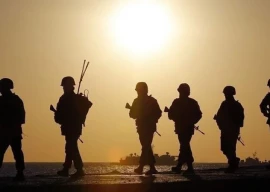


Terrorism is not one countries problem but when we talk about Pakistan, it was forced into the War on Terror by the US and international community. Now international community seems to be fed up by the cost and causalities in War on terror, trying to leave Pakistan in isolation. It is time for international community to revise their policy and end this WoT with negotiations.
National Security is of prime importance for a country. Since independence, Pakistan has undergone with lots of threats and challenges. But this is also a fact that Pakistan has maintained its sovereignty and statehood despite of all the turmoil and chaotic issues. Revisiting the national security certainly widens the perspective of Pakistan’s national security imperatives. Terrorism is an on-going global issue and it’s not at all adequate to labelled with Pakistan only.
@Nikki:
Then be it as you forecast, the cantonments will be turned into the cemetries for those who live in it, the people in Khaki will become the target of resistance and no major Pakistan city will have thesecurit .
Rex Minor
good neighbourly relations with the US?, India, Afghanistan and China completley overflying Ir Iran where terrorists from pakistani side kill 14 IRGC Irani Guards lieutenant general forget to even mention name of Ir Iran there is something not clear!
Every body talks about a diplomatic and political solution of Kashmir dispute without coming up with a possible solution .India has drawn a line in the sand---no redrawing of borders--Period. In Pakistan we don't have a credible policy other than protesting all the time. This we can continue until cows come home. Politicians across the board Imran included suggest secret or backdoor negotiations. What can they be after nearly 60 years of discussions? The simple truth is India needs Kashmir for it's secular credentials and pakistan needs it for it's unity- It is all about ideology. Common religious argument is not good enough. The way religion is practiced in Pakistan would send shudders down the back of kashmiris who practice a very moderate form- -Has any body noticed that word plebecite has disappeared from Pakistani vocabulary-..The only solution can be that Pakistan first puts it's house in order and show it's peaceful and prosperous face before enticing Kashmiris.
You don't need a CCNS or other committee - you need one person who is in-charge/responsible and elected by the voters. The military needs to accept that it reports to the elected Civilian govt - ain't that complicated.
Pakistan has since its inception been beset with internal contradictions and continues to remain unstable, unsure, and insecure about its future. This insecurity has manifested itself in Pakistan looking for allied co-operation and an enhanced optimism about its military capabilities.Due to internal and external challenges Pakistan is currently passing through a zig zag road. For that purpose there is need to make a policy which includes strategic and operational aspects, will provide a framework for the government to maintain public security.the policy which will review the operational capacity of the law enforcement agencies and provide more mechanisms to maintain law and order in cities and towns.and finally there is a need to devise a counter terrorism strategy and to over come this giant threat of terrorism.then there is a possibility of peaceand stability in the country.
Pakistan has achieved remarkable success during few years. The free and fair elections, hierarchical transformation all took place smoothly. This has shown the bright face of Pakistan to the World. Now the Main challenge ahead is National Security Plan. Pakistan must formulate such a strategy which should encompass the changing global dynamics to the fragile south Asian environment. Pakistan should Keep in mind the global and regional nukes development to maintain credible minimum deterrence. Besides that it is very crucial to meet internal challenges with wisdom.
At this stage Pakistan is facing internal theats not External...... So we need to avoid to rpeat the previous mistakes.
The writer a retired army officer has consistently given very good analysis. Away from this topic I would suggest to him to write about the move by govt to close or limit social media like skype,whatsap etc. Somewhere in the dark recesses of civil service lurk people associated with mobile or tele services that wants to make A BUCK by limiting access to the social media! Mount your steed Gen and charge this fallacy!
did you ever have any threat from India to have it "receded" now? Never.
From the night of Aug 14, 1947 India has been groping how to move past TNT and preserve the idea of India of all inclusive, diverse democracy. All the security threats were started by Pakistan starting with the very first one - the tribal invasion. And operation Gibraltar (1965) came first before Mukti Bahini (1970).
@Anjaan:
Its not a U Turn, in fact , at the end every body wants peace and peacful enviornment to live.
@Rex Minor:
Rex Mino.......your recommendations are so beautiful, but are not practiable in Pakistan. It is too late, however, more CANTT may be built in future.
The purpose of CCNS will serve only if the particpants have some rational agenda,if it has not met yet then when will it meet?when an incident occured here or there? In 1965,to my knowladge ,there was no political ledership and Gen. Ayoub went for an adventure becuase he had blind trust on American's assurnaces. In 1971, again there was an internal crisis and both political and military leaders wanted to impose their own wishes. In 1999, Kargil crisis was a set back for the political leadership which had lack of oversight on Gen. Musharraf...........instead of reminding and remembering the old bitter stories we should come out with practibale resolution. We should talk what is actual interest of Pakistan and what should be the prority ?We should not build castle in air or should not fire in air.The time has come to see the world with broader and clear lenses.Intrenational and regional politics both have been changed,so according to te existing mape, we need to think and re-think.
I read this article twice and found out to be thought provoking and refreshing. To me it came down to this sentence, "And it is crucial that the military leadership in its collective thinking remains in sync with the political government". Yes, that is exactly what we need, mature democracies has developed this scenario to the max and the political machine of those countries direct their self interests politically, economically and militarily, and military performs according to political directives. I hope this administration is far sighted enough to understand and grasp the precarious situation the country is facing instead of being pressured by foreign entities to do their bidding. Thank you for serving the nation.
This could have been a nice and bold write up if it was penned in October 2001. After promising to ally and be with the US/NATO against the Taliban and militant groups, Pakistan deceived them and gave shelter in its territory, at a huge cost to its credibility and internal cohesion. Now to want to change policy after havoc has already been wreaked, seems too little too late. The Politics of expediency and opportunism must give way to one of Wisdom. Often the best path is the toughest one to take, not the easiest one. Cleaning up the internal mess by going after the militants should be priority number one. Freedom and Liberty of all citizens is at stake.
The once General in his article seems to be playing with the theories and simply thinking loud and appear to be stuck with post september 11 strategy of the USA, which the supremo General Musharaf was cowed into making it his own and that of the Pakistan army. Pakistan army urgently needs reforms to mke it a National army which keeps at distance from the Napoleanic philosophies or those of Kemal Ata Turk and accepting the basic premise that the army is subservient to the civilian Government and must act on their orders. Pakistan has the choice to go the Egyptian way or follow the Syrian adventure, or simply become a Nation which is at peace with itself and its neighbours. The civilian Government should order its military to move out of the cantonments, which were built for the colonial army, and move out of the cities, allowing the civilian citizens to build their communities and the institutions as is followed in most democraies of the world.
Rex Minor
The most effective way to pursue the Kashmir issue with India is at the political and diplomatic level. And it is crucial that the military leadership in its collective thinking remains in sync with the political government.
then...what u have been doing for last 65 years....kargil......